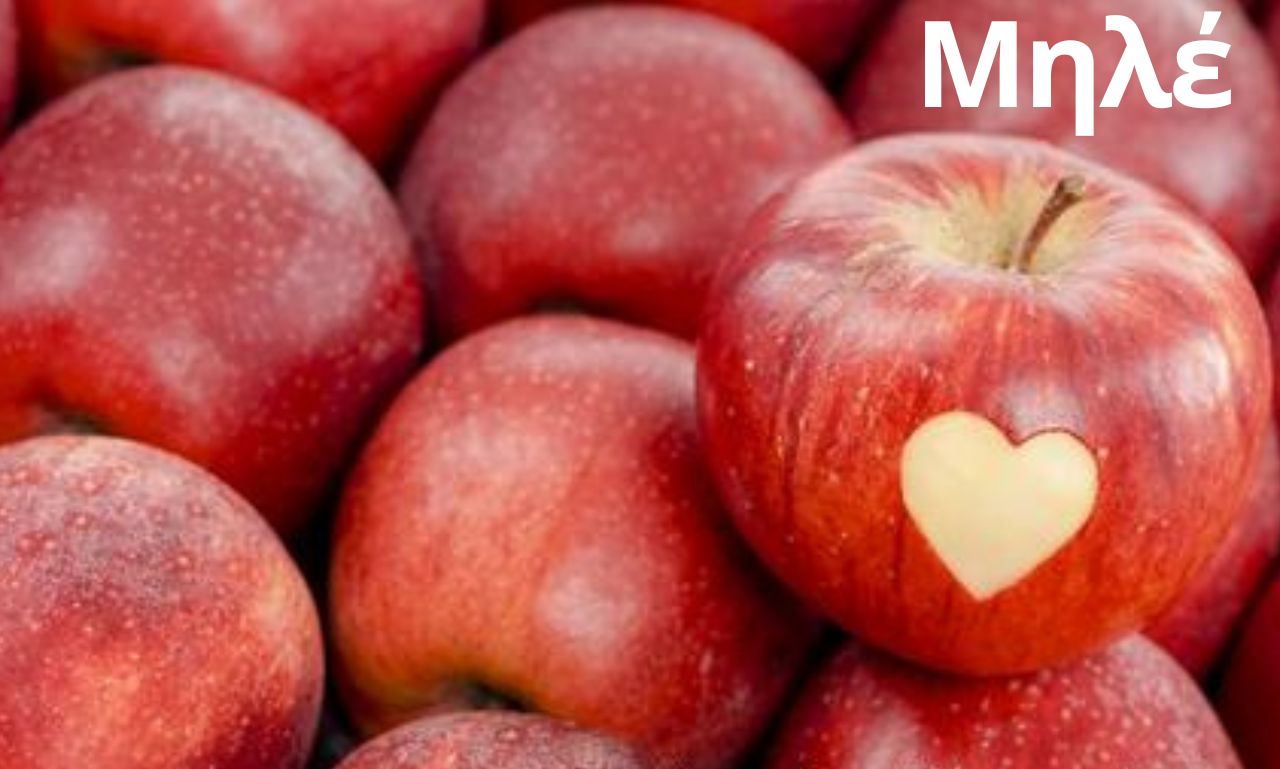Social Media
Μηλέ: The Ancient Apple of Greek Mythology

The term “μηλε” (pronounced ‘meelé’) refers to the apple, a fruit that holds significant importance in both ancient Greek mythology and contemporary culture. From the legendary tales of the Golden Apples to its presence in modern Greek agriculture and cuisine, the apple has been a symbol of beauty, knowledge, and prosperity. This article explores the multifaceted role of the apple in Greek mythology, its cultural impact, and its current status in Greece.
The Mythological Roots of Μηλέ
The Golden Apples of the Hesperides
One of the most famous references to apples in Greek mythology is the story of the Golden Apples of the Hesperides. These apples were said to grant immortality and were a wedding gift from Gaia (the Earth) to Hera. Guarded by the Hesperides, the nymphs of the evening, and a fearsome dragon named Ladon, these apples became the target of one of Hercules’ Twelve Labors. Tasked with retrieving these precious fruits, Hercules’ successful endeavor is one of the most celebrated myths involving apples, symbolizing a quest for eternal life and divine favor.
The Judgment of Paris
Another notable myth involving an apple is the Judgment of Paris. Eris, the goddess of discord, threw a golden apple inscribed with “to the fairest” among the goddesses Hera, Athena, and Aphrodite. Paris, a mortal prince, was chosen to decide the fairest of them all. His choice of Aphrodite, swayed by her promise of the most beautiful woman, Helen of Sparta, indirectly led to the Trojan War. This myth underscores the apple as a symbol of beauty, desire, and the catalyst of monumental events.
Apples in Ancient Greek Culture
Symbolism and Usage
In ancient Greece, μηλε apples were not just mythological symbols but also held everyday significance. They were often associated with love and marriage, commonly used in wedding ceremonies and offerings to deities. Apples symbolized fertility and were sometimes given as tokens of love.
Agricultural Practices
The cultivation of apples in ancient Greece was advanced for its time. Greeks practiced grafting and selective breeding to improve the quality of the fruit. They recognized various apple varieties and their specific uses, from eating fresh to preserving and making cider.
Modern Significance of Apples in Greece
Agricultural Importance
Today, apples remain a crucial part of Greek agriculture. Regions like Zagora in Pelion are renowned for their apple production, with varieties such as Starking and Golden Delicious being particularly popular. The Greek climate, with its combination of mountainous terrains and Mediterranean influence, provides ideal conditions for apple orchards.
Economic Impact
Apple production is a significant contributor to the local economy in many parts of Greece. The fruit is exported to various countries, bringing substantial revenue. Additionally, apple-related tourism, including festivals and farm visits, boosts the economic prospects of rural areas.
Apples in Greek Cuisine
Greek cuisine incorporates μηλε apples in various dishes, both sweet and savory. Traditional recipes like “milopita” (apple pie) showcase the fruit’s versatility. Apples are also used in salads, paired with cheese, and included in main courses to add a sweet and tart flavor profile. Their nutritional benefits, rich in vitamins and fiber, make them a popular choice for health-conscious consumers.
Cultural Celebrations
Apple Festivals
Numerous apple festivals are held across Greece, celebrating the harvest and promoting local varieties. These festivals feature events such as apple picking, cooking demonstrations, and cultural performances, fostering community spirit and preserving agricultural traditions.
Educational Initiatives
There are also educational programs aimed at promoting. Sustainable apple farming practices and encouraging the younger generation to engage in agriculture. Schools often organize trips to apple orchards, where students learn about the cultivation process and the importance of agriculture in Greek history and economy.
Conclusion
The apple, or “μηλε,” has traversed a fascinating journey from the pages of Greek mythology to the orchards of modern Greece. It remains a potent symbol of beauty, knowledge, and prosperity. Whether through its mythological tales or its tangible presence in agriculture and cuisine,. The apple continues to be a cherished and significant part of Greek heritage. As Greece moves forward, the enduring legacy of the apple promises to remain a core element of its cultural and economic landscape.

Social Media
What does TBT mean on Instagram?

It stands for “Throwback Thursday” and the hashtag #TBT which are not new. It’s possible that the person who provided it to me thought it was an embarrassing photo from a high school yearbook. It may have been a picture from your mother’s Instagram account from the vacation you took last year, for example. For all we know, the tweet might’ve just been about a recent party. It’s no secret that TBT is a very popular hashtag used by almost everyone, from your aunt to influencers, celebrities, and even former US first ladies. Using TBT as a way to share stories and have a little fun on social media is a great opportunity for organizations.
Examples:
John: # TBT going through some old pictires.
Marry: Yeayy.
What does the acronym TBT stand for & What is its actual meaning?
‘TBT’ stands for “Remember When?”. It’s a popular platform for uploading old photos and videos of oneself as a way to re-live happier times.
What does Tbt mean in business?
TBT For a business. TBT is a fantastic opportunity to communicate with their customers, increase their company’s exposure, and tell tales about their products or services. The hashtag #TBT is useful for a number of reasons. To this day, the hashtag #tbt has become one of the most often used on social media. There are three major advantages to utilizing this tool: you will be able to do three really critical tasks. Increase the degree of audience participation by increasing the number of participants.
According to Twitter, brands who used hashtags more often had a 50 percent increase in interaction on their tweets when compared to firms that did not use hashtags. A large number of individuals use a variety of hashtags to keep things fresh, including the #TBT hashtag. As a consequence, if you make use of it, your article will show in their feeds, exposing your company to a whole new set of customers. In order to increase the brand’s visibility.
The hashtag #TBT allows you to share with the world who you are as a business and how you got your start. You may be able to connect the tale of your firm to new audiences by using old photographs and videos.
Summary
| WORD: | TBT |
|---|---|
| Definition: | Throwback Thursday |
| Type: | Abbreviation |
What does tbt mean in the text on Instagram & Snapchat?
In-text on Snapchat or Instagram, Tbt is a texting abbreviation that stands for two words. One is referred to as Throwback Thursday, while the other is referred to as Truth Be Told. The phrase “Truth Be Told” is used to set the stage for a potentially contentious or painful confession or declaration. TBT is comparable to the acronym TBH in this regard (To Be Honest).
What does Meaning for throwback
Throwback means a return to an older way of doing something, or a revival of an old trait, that has previously been noticed. In a less formal way, the word flashback can be used to express atavism. To use one of these expressions is to go back and redo anything that has already been accomplished (or exists). A flashback is something like having red hair like your great-grandmother. An old-school uniform is one that looks like one that was worn in the past by a sports team. When an evolutionary trait returns after being lost, it is known as a “throwback” in biology.
More words that are similar in meaning:
What does Throwback pic meaning
Throwback pics often include happy memories or amusing flashbacks to bygone eras of fashion and beauty. There is no limit to the number of Throwback Thursdays that may be linked to any picture in one’s prior recollections ranging from remembrances of early life to old connections to trips to old music.
Social Media
Spice up Your Love Life with These Hilarious Pick Up Lines

Are you ready to add some spice to your love life? Looking for a fun and light-hearted way to break the ice with that special someone? Well, look no further! In this blog post, we’re diving into the world of pick-up lines—those quirky one-liners that have the power to make you laugh or cringe. Join us as we explore the science behind pick-up lines, share some hilarious examples, and even hear real-life success stories. Get ready to charm your crush and inject some humor into your romantic endeavors!
The Science Behind Pick Up Lines
Ever wondered why pick up lines can sometimes work like magic to spark a connection between two people? Well, there’s actually some science behind it. When someone uses a clever or funny pick up line, it can trigger positive emotions in the brain. Laughter releases feel-good hormones like endorphins and dopamine, creating a sense of happiness and bonding.
Additionally, using a well-crafted pick-up line shows confidence and creativity, which are attractive qualities to many individuals. It signals that you’re willing to put yourself out there and take a playful risk in starting a conversation with someone new.
Moreover, pick up lines can serve as icebreakers that break the initial awkwardness of approaching someone you’re interested in. They provide a light-hearted way to initiate contact and engage in conversation without diving straight into serious topics.
In essence, while not all pick up lines may be successful, understanding the psychology behind them sheds light on why they continue to be used as tools for building connections and sparking romantic interest.
Types of Pick-Up Lines
When it comes to pick up lines, there are a whole variety of styles and approaches. From cheesy one-liners to witty remarks, the types of pick-up lines are as diverse as the people using them.
One popular type is the classic cheesy pick up line. These can range from “Are you a magician? Because whenever I look at you, everyone else disappears,” to “Do you have a name, or can I call you mine?” Cheesy lines may be overused, but they never fail to bring a smile.
Another type is the clever pick up line. These lines show off wit and intelligence, like “If beauty were time, you’d be an eternity” or “Excuse me, but I think you dropped something: MY JAW!” Clever lines can make someone laugh while also showing genuine interest.
Then there are flirty pick up lines that aim to create playful banter and build romantic tension. Lines such as “Can I follow you where you go? Because my parents always told me to follow my dreams,” adds a fun element to flirting and can spark intrigue between two people.
No matter what type of pick up line someone chooses to use, the key is delivery and authenticity. It’s important for the line to match the person’s personality and style so that it comes across as genuine rather than forced. So whether it’s cheesy, clever, or flirty – have fun experimenting with different types of pick up lines!
Top 10 Hilarious Pick Up Lines
Embark on a journey through the fun and quirky world of pick-up lines with our top 10 list that will make you chuckle and maybe even blush a little.
1. “Are you made of copper and tellurium? Because you’re Cu-Te.”
2. “Do you have a name, or can I call you mine?”
3. “Excuse me, but I think you dropped something: MY JAW!”
4. “Is your name Google? Because you have everything I’ve been searching for.”
5. “If beauty were time, you’d be an eternity.”
6. “Do your legs hurt from running through my dreams all night?”
7. “Can I follow you where you go? Because my parents always told me to follow my dreams.”
8. “Are we at the airport? Because my heart is taking off.”
9. “I must be a snowflake because I’ve fallen for you.”
10.“Sorry, but can’t find my phone number… Can I have yours?”
These witty lines are sure to break the ice and spark some laughter in any conversation!
Do’s and Don’ts of Using Pick Up Lines
When it comes to using pick-up lines to spice up your love life, there are a few key do’s and don’ts to keep in mind. First off, do try to tailor your pick-up line to the person you’re interested in – personalizing it can make all the difference.
Do keep it light-hearted and fun; humor goes a long way when breaking the ice. On the flip side, don’t use overly cheesy or inappropriate lines that could come across as insincere or offensive.
Another important tip is to be confident when delivering your pick-up line – self-assurance is attractive! However, avoid being too aggressive or pushy, as this can easily backfire.
Remember that timing is everything. Choose the right moment to deliver your line for maximum impact. By following these simple guidelines, you’ll increase your chances of success when using pick-up lines in your romantic pursuits.
Success Stories: Real Life Experiences with Pick Up Lines
Ah, the power of a clever pick-up line! Real-life experiences show just how effective they can be in sparking connections. Take Sarah, for example. She was at a party when John approached her with a cheesy line about being lost in her eyes. They ended up chatting all night and are now happily together.
Then there’s Alex, who used a punny line about coffee to break the ice with his crush at a café. It led to exchanging numbers and meeting up for more coffee dates. Sometimes, these lines can lead to unexpected but delightful outcomes.
Not every attempt is successful, of course. But those moments where pick-up lines work like magic make them worth trying out. So next time you’re feeling bold, why not give it a shot? You never know where it might lead – maybe to your own success story!
Conclusion
As we wrap up our exploration of pick-up lines, it’s clear that these playful phrases can add a fun and lighthearted touch to your interactions. Whether you’re looking to break the ice with someone new or simply inject some humor into your relationship, pick-up lines have their own special charm.
Remember, using pick-up lines should always be done with respect and a good sense of humor. While they may not work for everyone, the key is to embrace the light-hearted nature of these witty one-liners.
So next time you’re feeling bold and adventurous, why not give a pick-up line a try? You just might be surprised by the positive response you receive! And who knows, it could lead to an unexpected connection or even a good laugh.
Keep in mind that communication is key in any interaction. So whether you choose to use pick-up lines or not, being genuine and authentic will always be your best asset when it comes to building meaningful connections with others.
FAQs
1. What makes a good pick up line?
A good pick up line is clever, funny, and shows genuine interest in the other person. It should be light-hearted and not too aggressive or cheesy.
2. Are pick up lines effective in real life?
Pick up lines can be hit or miss, but they can break the ice and start a conversation. The key is to deliver them with confidence and a sense of humor.
3. Can anyone use pick up lines?
Yes, anyone can use pick up lines! Just make sure to choose ones that suit your personality and style.
4. How do I know if someone is interested when using a pick-up line on them?
Pay attention to their body language and response. If they smile, laugh, or engage with you further, it’s likely they are interested in continuing the conversation.
5. Should I rely solely on pick-up lines to attract someone?
While pick up lines can be fun and entertaining, it’s important to also show genuine interest in getting to know the person beyond just a witty one-liner. Use them sparingly and remember that authenticity goes a long way in building meaningful connections.
Social Media
From Myth to Reality: How Rongokurai Boon is Making Waves in the Modern World

Step into a world where ancient myths meet modern marvels, where the mystical merges seamlessly with the scientific. Welcome to the realm of Rongokurai Boon – a phenomenon that has captivated minds and sparked imaginations for centuries. Join us on a journey as we unravel the mysteries surrounding this enigmatic boon and explore its surprising impact in today’s fast-paced world.
A Brief History of Rongokurais Boon
Rongokurai Boon has a history shrouded in mystery and intrigue, dating back centuries to ancient civilizations. Legends speak of a powerful blessing bestowed upon those deemed worthy, granting them unparalleled abilities beyond imagination.
Stories passed down through generations tell of individuals harnessing the energy of nature itself, using Rongokurai’s Boon to heal the sick, protect their people from harm, and even communicate with other realms. The origins of this boon remain unclear, lost in the mists of time.
Throughout history, whispers of Rongokurai Boon have echoed across different cultures and lands, each adding their own unique twist to the myth. From shamans in remote villages to royalty in grand palaces, tales abound of its miraculous powers changing lives forever.
As civilization evolved and technology advanced, the legend of Rongokurai’s Boon persisted, adapting to fit into modern narratives while still holding onto its ancient roots. Today, this mystical gift continues to captivate hearts and minds around the world as people seek to uncover its true essence amidst a sea of skepticism and disbelief.
Modern Applications of Rongokurais Boon
In the modern world, Rongokurai’s Boon has found new and innovative applications that are revolutionizing various industries. One of the most notable uses is in agriculture, where it has been shown to significantly increase crop yields and improve plant health. Farmers around the globe are adopting this ancient practice to enhance their harvests and promote sustainable farming methods.
Moreover, Rongokurai’s Boon has also made its way into the realm of alternative medicine. Many practitioners now incorporate its principles into holistic healing techniques, harnessing its energy-balancing properties to treat a wide range of physical and emotional ailments. The results have been promising, with patients reporting improved well-being and faster recovery times.
Furthermore, technology companies are exploring how Rongokurai’s Boon can be integrated into wearable devices to promote mindfulness and reduce stress levels in individuals. By tapping into this ancient wisdom, they hope to offer consumers a natural solution for managing their mental health in today’s fast-paced world.
The Science Behind It: How Does Rongokurai Boon Work?
Have you ever wondered about the science behind Rongokurais Boon? This mysterious phenomenon has captivated researchers and scientists alike for years, sparking curiosity and intrigue. The key to understanding how it works lies in its unique energy signature, which interacts with the environment in a way that defies conventional logic.
At its core, Rongokurais Boon harnesses subtle energies that are not yet fully understood by modern science. These energies have been said to influence everything from physical health to mental wellbeing, providing a sense of balance and harmony to those who experience its effects. While the exact mechanisms at play remain shrouded in mystery, one thing is clear – there is something truly special about this ancient gift.
Research into Rongokurais Boon continues to uncover new insights into its potential applications and benefits. As more studies are conducted and more data is collected, we may soon unlock the secrets behind this enigmatic force of nature. Stay tuned as we delve deeper into the scientific mysteries of Rongokurais Boon!
Criticisms and Controversies Surrounding Rongokurais Boon
While Rongokurais Boon has gained popularity for its alleged benefits, it hasn’t been without its fair share of criticisms and controversies. Some skeptics argue that the lack of scientific evidence supporting its effectiveness raises doubts about its validity.
Others question the ethical implications of commercializing a traditional practice that holds cultural significance for certain communities. There are also debates over whether the widespread adoption of Rongokurais Boon could lead to exploitation or appropriation of indigenous knowledge.
Furthermore, some experts point out the need for more rigorous research and regulation to ensure consumer safety and prevent misinformation. Despite these criticisms, supporters of Rongokurais Boon continue to advocate for its use based on anecdotal evidence and personal experiences.
Real-Life Examples of the Impact of Rongokurai Boon
Rongokurais Boon has left a tangible mark on various industries, showcasing its versatility and effectiveness in the modern world. In the healthcare sector, researchers have utilized this innovative technology to develop advanced medical treatments that target specific ailments with remarkable precision.
Moreover, in agriculture, farmers have embraced Rongokurais Boon to optimize crop yields and ensure sustainable farming practices. By harnessing its power, they can enhance soil quality and reduce reliance on harmful chemicals.
In the realm of renewable energy, engineers are exploring how Rongokurais Boon can revolutionize clean energy production by maximizing efficiency and minimizing environmental impact. This groundbreaking approach has the potential to reshape the future of energy generation worldwide.
Furthermore, in urban planning and architecture, designers are incorporating Rongokurais Boon principles to create eco-friendly buildings that promote sustainability and harmonize with nature. The possibilities seem limitless as more industries continue to embrace this transformative technology for positive change in our world.
The Future of rongokurais boon
As we look to the future of Rongokurais Boon, the possibilities are endless. With advancements in technology and research, this ancient practice is being integrated into modern solutions like never before. Scientists and innovators are exploring new ways to harness its power for various applications across industries.
One exciting prospect is the potential use of Rongokurais Boon in sustainable energy production. Imagine a world where renewable resources are even more accessible thanks to this age-old wisdom. The impact on our environment could be monumental, paving the way for a greener future.
Furthermore, in the field of medicine, researchers are delving deeper into how Rongokurais Boon can enhance healing processes and improve overall well-being. Its holistic approach may revolutionize healthcare practices, offering alternative methods for treating ailments.
As we continue to unlock the mysteries behind Rongokurais Boon, one thing is certain – its influence will only grow stronger in shaping our world’s tomorrow.
Conclusion
Rongokurais Boon has evolved from a mythical concept to a tangible reality with significant implications in the modern world. Its ancient origins have paved the way for innovative applications across various industries, showcasing its potential to revolutionize our understanding of energy and healing.
Despite facing criticisms and controversies, Rongokurai Boon continues to prove its worth through real-life examples that demonstrate its positive impact on individuals and communities. With ongoing research and development, the future holds promising advancements that could further unlock the full potential of this extraordinary phenomenon.
As we continue to explore the science behind Rongokurai Boon and harness its power for good, one thing remains clear – this ancient boon is not just a myth but a transformative force shaping our present and future in ways we are only beginning to comprehend.
-

 Business2 months ago
Business2 months agoWhat does Incumbent mean in business?
-

 Text2 months ago
Text2 months agoPH
-

 Text2 months ago
Text2 months agoWhat does smh mean in text?
-

 Text2 months ago
Text2 months agoKN
-

 News1 month ago
News1 month agoDiscover MyLawyer360: Your One-Stop Legal Assistance Hub
-

 Business1 month ago
Business1 month agoLessInvest.com Crypto: Your Gateway to Smarter Investments
-

 sports1 month ago
sports1 month agoThe Versatile Talent of ben foster: A Deep Dive into His Career
-

 Health1 month ago
Health1 month agoThe Comprehensive Guide to Mega-Personal.net Health Archives